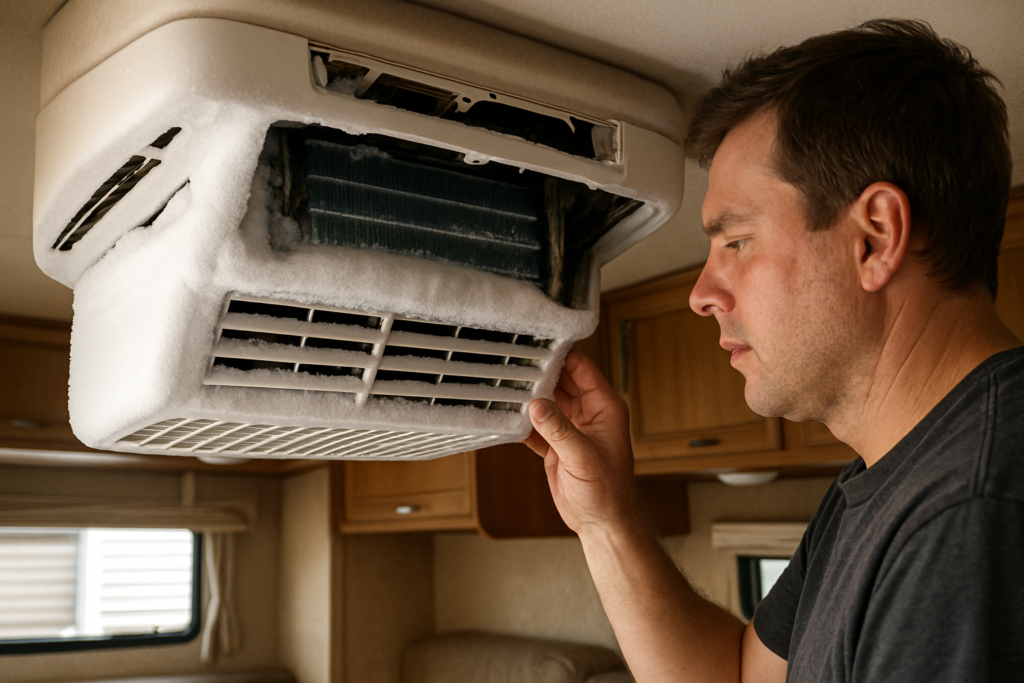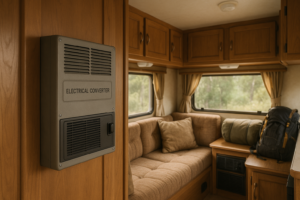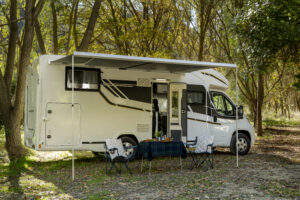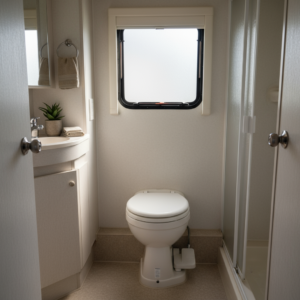
Why Is Your RV AC Freezing Up? Causes, Fixes & Prevention Tips
Table of Contents
Is your RV AC freezing up just when you need it most? You’re not alone. Many RV owners experience ice build-up on their air conditioner coils, especially during hot, humid trips or after long periods of non-use. A frozen RV AC unit can quickly turn your road adventure into an uncomfortable situation—leaving you with weak airflow, rising temperatures inside your rig, and even water dripping from the vents.
In this guide, you’ll learn exactly why your RV air conditioner is freezing up, how to troubleshoot the issue, and what you can do to prevent it from happening again. Whether it’s a dirty air filter, low refrigerant, or a fan or thermostat setting gone wrong, we’ll break it down step-by-step.
And if you’re not up for diagnosing it yourself, Good Sam RV ProCare can bring certified technicians directly to your location—whether you’re at home, in storage, or set up at a campsite. Let’s get started.
What Does It Mean When Your RV AC Is Freezing Up?
When your RV air conditioner is freezing up, it means that moisture in the air is turning to ice on the evaporator coils instead of cooling your RV properly. You might notice ice forming around the AC vents, reduced airflow, or even water dripping once the unit starts to thaw. These are signs that your system isn’t working the way it should—and if left unaddressed, it can lead to compressor damage or more costly repairs.
A frozen RV AC unit typically signals that something is disrupting the normal cooling cycle—whether it’s restricted airflow, incorrect thermostat settings, or a low refrigerant issue. If your AC freezes repeatedly, it’s not just an inconvenience—it’s a warning sign that could cause damage to both the condenser and evaporator coils or even your RV’s HVAC system.
Understanding what’s happening behind the scenes helps you take the right steps to defrost your RV AC, avoid future freeze-ups, and extend the life of your cooling system. Up next, we’ll explore the most common reasons your RV AC may be freezing up—and how to fix them.
Top Reasons Your RV AC Is Freezing Up
A frozen RV air conditioner isn’t just frustrating—it’s your system’s way of telling you something’s off. Let’s break down the most common reasons your RV AC is freezing up, so you can spot the issue before it gets worse.
1. Dirty Air Filters or Blocked Vents
When your AC air filter is clogged with dust or debris, airflow drops dramatically. Without proper airflow, the evaporator coil can get too cold and cause ice to form on the coil surface. Similarly, if your return air vents are blocked—by luggage, furniture, or closed doors—cool air won’t circulate as it should.
What to do: Check your air filter regularly and clean or replace it as needed. Keep vents clear and unobstructed to maintain smooth airflow.
2. Low Refrigerant Levels
Low refrigerant reduces the pressure inside the cooling system, causing the evaporator coils to become colder than they should. This imbalance leads to ice buildup—eventually causing a freeze on the coils. This issue can also affect the condenser coils and overall air conditioning performance, leading to inefficient cooling.
What to do: This issue usually requires a professional. If your RV AC keeps freezing despite clean filters and good airflow, it’s time to get your refrigerant levels checked.
3. Running AC in Cool Temperatures
Your RV air conditioner isn’t designed to run in cold weather. If you turn it on when the outdoor temperature is below 65°F, there’s a high chance the coils will freeze because there’s not enough heat in the air to keep the system balanced.
What to do: Avoid using the AC during chilly mornings or evenings. Use fans or open windows for ventilation instead.
4. Thermostat or Fan Issues
If your thermostat is miscalibrated or your fan isn’t working properly, the AC may run too long without shutting off or fail to push enough air through the system. Both situations can cause your AC to freeze up.
What to do: Double-check your thermostat settings. Use the “Auto” mode instead of “On” to allow proper cycling. If the fan doesn’t sound right or isn’t pushing air consistently, it may need servicing.
5. Faulty or Dirty Evaporator Coil
Over time, dust and grime can build up on the evaporator coil, acting like insulation and preventing heat exchange. The coil then gets too cold, leading to ice formation on its surface. In some cases, the fin or coils may be damaged or corroded, which could be the root of your freezing issue.
What to do: Cleaning the coil requires a bit of access and care. If you’re not comfortable removing the cover or don’t see immediate results after defrosting, professional help may be your best option.
Step-by-Step: How to Fix a Frozen RV AC Unit
If your RV AC is freezing up, don’t panic. You can often get things back to normal by following a few simple steps. Here’s a quick guide to help you defrost your RV air conditioner and address the root cause of the issue.
Step 1: Turn Off the Unit and Let It Defrost
First things first—shut off your AC completely. Let the unit thaw out naturally, which may take a few hours. Running a fan (on “Fan Only” mode) can help speed up the defrosting process by improving airflow over the coils.
Tip: Avoid chipping away at the ice—it can damage the coils and lead to costly repairs.
Step 2: Check and Clean Air Filters
Once the system has thawed, remove and inspect your RV AC air filter. If it’s dusty or clogged, give it a thorough cleaning—or replace it if it’s too worn. A dirty filter is one of the most common reasons for ice buildup on AC coils.
Keeping your filter clean ensures proper airflow and helps prevent future freeze-ups.
Step 3: Inspect Air Vents for Obstructions
Walk through your RV and make sure all air vents are clear. Blocked vents—especially return air vents—can restrict airflow and contribute to freezing. Move any bags, bedding, or furniture that might be covering vents.
Good circulation is key to keeping your AC running efficiently.
Step 4: Set Thermostat Correctly
Your thermostat setting plays a big role in system performance. Use the “Auto” mode instead of “On” to ensure the compressor cycles off and on properly. Avoid setting the temperature too low in mild weather—this can cause the evaporator coil to freeze.
Adjust your fan speed to medium or high to maintain airflow and balance cooling.
Step 5: Schedule a Refrigerant Check (If Needed)
If your RV AC continues to freeze after taking these steps, you could be dealing with low refrigerant levels—a problem that requires a licensed technician. Refrigerant issues can’t be fixed DIY and may cause further damage if left untreated.
Not sure where to start? A professional diagnosis ensures you’re not just treating symptoms but fixing the real issue.
Preventing RV AC Freeze-Ups: Expert Tips
Once you’ve thawed your system and restored airflow, the next step is making sure it doesn’t freeze up again. Preventive maintenance goes a long way in keeping your RV air conditioner running efficiently—especially during hot or humid trips.
Follow these tips to avoid another icy surprise:
Clean or Replace Your Air Filter Monthly
A clogged air filter is one of the most common causes of poor airflow and frozen coils. Set a reminder to inspect and clean the filter every 30 days, especially during peak travel months. If you travel frequently or in dusty environments, check it more often.
Keep Return Air Vents Unobstructed
Don’t overlook ventilation. Make sure your return air vents aren’t blocked by rugs, furniture, or bags. Good airflow ensures the evaporator coil maintains the right temperature and prevents condensation from turning into ice.
Avoid Running AC in Cool Weather
Your RV AC unit isn’t designed for use when outside temperatures drop below 65°F. Running it in cooler conditions can lead to coil freeze-ups. Instead, use the fan setting or open windows to ventilate your space.
Use Proper Thermostat and Fan Settings
Set your thermostat to “Auto” mode so the compressor cycles correctly. Keep your fan on medium or high to ensure continuous airflow across the coils. Avoid using the “On” setting for extended periods, especially in humid conditions.
Check for Moisture and Humidity Inside Your RV
High humidity accelerates ice buildup. Use a small dehumidifier when parked in wet climates, and keep windows and roof vents closed while running the AC. Managing moisture helps your unit maintain optimal performance.
Schedule Seasonal Maintenance
Have your RV’s cooling system inspected by a professional before the summer and winter seasons. A technician can clean the evaporator coil, check refrigerant levels, and ensure your system is running at peak efficiency.
Want the convenience of professional service at your doorstep? Good Sam RV ProCare offers on-site RV inspections and maintenance—so you can keep your AC system in top shape without hauling your rig to a service center.
Next, we’ll cover when it’s time to stop troubleshooting and call in the pros for a frozen RV AC unit that won’t stay fixed.
When to Call a Professional for RV AC Repair
While some RV AC freeze-up issues can be fixed with basic troubleshooting, others point to deeper mechanical problems that require expert attention. Knowing when to stop DIY and bring in a certified technician can save you time, money, and frustration.
Here’s when to call for professional RV AC repair:
1. Your AC Keeps Freezing Repeatedly
If your AC freezes up again shortly after defrosting, even with clean filters and open vents, the issue might be tied to low refrigerant, a failing expansion valve, or internal coil damage—none of which can be resolved without the right tools and expertise.
2. You Suspect a Refrigerant Leak
Handling refrigerant isn’t a DIY job. It requires special certifications and equipment. Signs like reduced cooling, hissing sounds, or constant freezing suggest a refrigerant issue—and should be handled professionally to avoid further damage.
3. Your Fan or Compressor Isn’t Functioning Correctly
Strange noises, weak airflow, or an AC unit that runs continuously may point to a faulty fan motor or compressor—both of which are critical components. These parts should only be diagnosed and replaced by someone trained in RV AC systems.
4. You’re Not Sure What’s Causing the Problem
If you’ve followed all the basic steps—defrosted the system, checked filters and vents, adjusted settings—and your RV air conditioner is still freezing up, it’s time to call in a pro. There’s no point guessing when a quick diagnosis can get you back on the road faster.
Let Us Come to You
Good Sam RV ProCare offers mobile RV AC repair services wherever you are—at a campsite, storage facility, or your own driveway. With remote diagnostics via video chat and certified RV technicians, you get expert help without towing your rig to a shop.
We aim to respond within 12–24 hours, and in many cases, complete the repair in just one visit—so your next road trip stays cool and stress-free.
Final Thoughts – Stay Cool and Prevent AC Freeze-Ups
A frozen RV AC unit might seem like a minor inconvenience at first, but it can quickly snowball into bigger problems if ignored. Fortunately, now you know exactly what causes your RV air conditioner to freeze up, how to fix it, and—more importantly—how to stop it from happening again.
By keeping your air filters clean, checking your thermostat settings, and ensuring unobstructed airflow, you can protect your AC system and enjoy consistent cooling no matter where the road takes you. Avoid running the AC in cool or damp conditions, and don’t hesitate to schedule seasonal maintenance to keep your system in peak shape.
Keep your RV cool, your travels smooth, and your AC unit ice-free.
Frequently Asked Questions (FAQs)
Still have questions about your RV AC freezing up? Here are answers to the most common concerns RV owners have when dealing with this issue.
Can I still run my RV AC while it’s frozen?
No. Running your AC while it’s frozen can strain the compressor, block airflow, and lead to long-term damage. Turn the unit off and let it fully defrost before using it again.
How long does it take for a frozen RV AC to thaw?
It usually takes 2 to 4 hours to fully defrost a frozen AC unit, depending on how much ice has built up. You can speed up the process by switching the unit to “Fan Only” mode to improve airflow over the coils.
What’s the best setting to prevent my RV AC from freezing?
Use the “Auto” thermostat mode instead of “On.” This allows the compressor to cycle properly and prevents excessive coil freezing. Also, avoid setting the temperature too low, especially in mild or humid weather.
Can low voltage cause my RV AC to freeze?
Yes. Low voltage from campground power or worn extension cords can reduce fan speed and airflow, which in turn lowers coil temperature and increases the chance of freezing. Always use a surge protector and voltage monitor when plugging in.
Why does my AC freeze only at night or in the early morning?
Cooler nighttime temperatures reduce airflow demand and can cause your AC coils to drop below freezing—especially if the system is already borderline. Try turning the unit off at night or running the fan only during those hours.
Do rooftop and portable RV AC units freeze for the same reasons?
Yes, both types of units can freeze due to restricted airflow, thermostat issues, or low refrigerant. Rooftop units are more common in RVs and usually easier to service, but portable models should still be checked regularly for filter and vent blockages.


